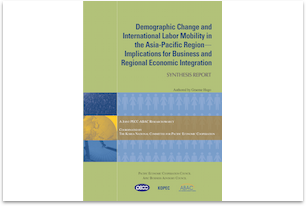 Demographic Change and International Labour Mobility in the Asia-Pacific Region - Implications for Business and Regional Economic Integration
Demographic Change and International Labour Mobility in the Asia-Pacific Region - Implications for Business and Regional Economic Integration
Authored by Graeme Hugo
Published in 2008 by the Korean National Commitee for Pacific Economic Cooperation (KOPEC)
A Joint PECC-ABAC Research Project
One of the most remarkable and beneficial aspects of Asia-Pacific integration in the past half century has been the growing and massive international movement of people on a temporary and permanent basis. Such movements typically have brought tremendous economic benefit to the region. Through people movements, net destination economies compensate for labor and skill shortages, and may deter industries from moving off-shore to more labor-rich locations. Investment would increase as a result. For net origin economies individuals are provided with opportunities and income, remittance flows become an enormous source of foreign exchange earnings, and student and trainee movements have facilitated the acquisition of skills.
Economic analysis tells us that in aggregate the benefits of enhanced labor mobility far outweight adjustment costs and are an essential and crucial element in the Asia-Pacific growth story. This will continue to do so. Demographic transformations, widening differences in levels of economic nad educational development and continued regionalization and globalization of industry, all suggest that Asia-Pacific economies will almost certainly require ever greater international movements of labor in the future.
- Introduction
- The Demographic Context
- Changing Patterns of Labor Migration in the Asia Pacific
- Drivers of the New Labor Migration
- Labor Migration and Development
- Labor Migration Issues in APEC
- Labour Migration Policy in APEC
- Existing Cooperation on Migration in APEC Economies
- Recommendations
